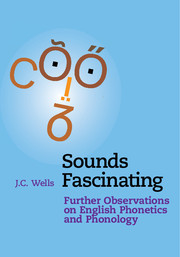11 - Spelling
from PART II - SOUNDS AND LETTERS
Published online by Cambridge University Press: 05 September 2016
Summary
Phrasebooks
There've been some interesting internet postings on the topic of how pronunciation is indicated in phrasebooks intended for travellers.
Phrasebooks aimed at an English-speaking readership typically use an ad hoc respelling system based on English spelling conventions. As Heidi Harley has pointed out in Language Log (http://languagelog.ldc.upenn.edu/nll/?p=283), many of them presuppose a British or at least non-rhotic accent on the part of the user. In her comparative test of three French phrasebooks, she reports that one of them offers:
Where are the bus [coach] stops?
Où sont les arrêts de car?
oo sawng lay areh der kar
How long does the trip [journey] take?
Combien de temps dure le voyage?
kawnbyang der tahng dewr ler vwahyazh?
Heidi doesn't supply an IPA version of these phrases, which in proper French would be
u sõ lez aʁɛ d(ə) kaːʁ
kõbjæ̃ d(ə) tɑ̃ dyʁ lə vwajaːʒ
– or thereabouts. (As is customary, I use the IPA symbol ə to cover a range of varieties of mid central vowels. The French version is usually somewhat rounded, and not necessarily distinct from ø.)
By following the respelling, non-rhotic speakers would read arrêts de car as ɑːɹeɪ də kɑː (or with æ for the first vowel), which is perhaps not too bad. Rhotic speakers, though, would read it as ɑɹeɪ dɚ kɑɹ, in which the unwanted r-coloration of de is not good at all.
Another interesting article on the web, by Randy Alexander and now no longer recoverable, concerned English phrasebooks aimed at Chinese users. It included this sample phrase. The second line is the Chinese imitated pronunciation of the English phrase, repeated in the third line in Hanyu pinyin.
Yes, of course.
业丝 厄弗 靠斯
yèsī èfú kàosī
In IPA that would be jesɯ ɤfu kaosɯ plus a lot of distracting prosody and alveolarization.
In the original article you can also hear sound clips of the results.
As Heidi says, and I agree with her,
I find the whole phrasebook orthography situation pretty weird. It's another clear example of a situation in which providing English speakers with the rudiments of a linguistic education – in this case, a smidgen of basic phonetics and a bit of a clue about the IPA – would be useful in a seriously practical way.
- Type
- Chapter
- Information
- Sounds FascinatingFurther Observations on English Phonetics and Phonology, pp. 85 - 107Publisher: Cambridge University PressPrint publication year: 2016

